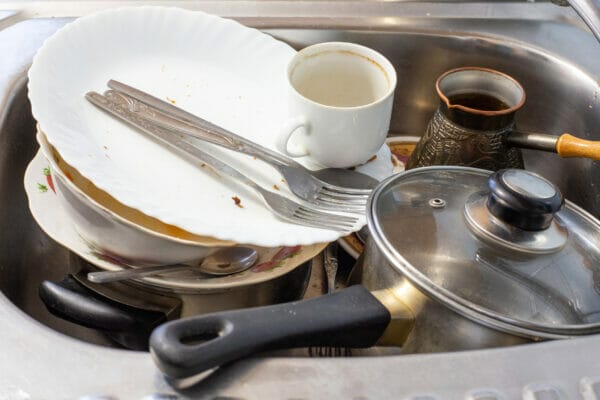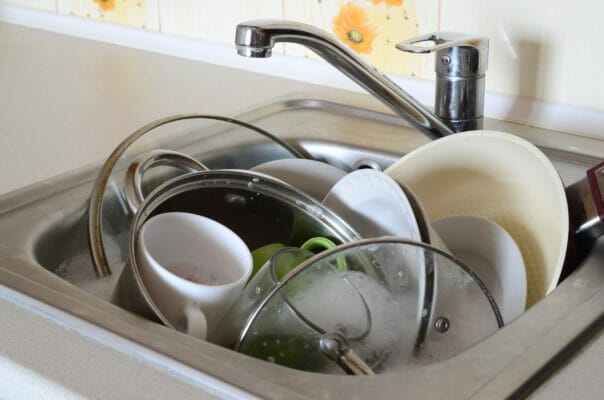Disclaimer: This post may contain affiliate links, meaning we get a small commission if you make a purchase through our links, at no cost to you. For more information, please visit our Disclaimer Page.
Unless it is an emergency, you should not leave dirty dishes in the sink overnight. Otherwise, you increase the risk of germs spreading, especially if kids or pets are in the house. Additionally, leaving the dishes to dry in the sink makes the job of cleaning them more of a nuisance.

Table of Contents
How Long Does It Take for Bacteria to Grow on Dirty Dishes?
This will depend on the type of bacteria as each species have their own growth rates. But on dirty dishes, they can grow as fast as doubling their number in under 20 minutes.
Bacteria and similar germs have a diverse resume of habitats and can basically grow anywhere inside your residence. But the dirty dishes sitting on your kitchen top or soaking in the sink are almost too good of a place to ignore. Why?
Well, because bacteria, like all other living organisms, require nutrients. Parasitic bacteria and fungus will derive their food source directly from the host, typically animals. But non-parasitic bacteria, which is most of them, can grow anywhere that is hospitable to them.
Now, these things are very small but large in number. So, when we say bacterial growth, we are referring to the reproduction and multiplication of bacteria. Even a minuscule number of bacteria can cause a full-on outbreak if the environment is suitable.
Extensive research on this topic has found that many bacteria can double in number in just 20 minutes or less.
And the ideal temperature for this exponential growth is between 40 to 120 degrees Fahrenheit. Experts refer to this range as the “danger zone”, which easily encompasses the temperature you will find in any home.
Why Do Bacteria Grow So Rapidly on Dirty Dishes?
Bacteria show such a rapid rate of reproduction mainly because of two things – their simple anatomy and even simpler method for reproduction.
With a few exceptions, most bacteria are single-cell creatures. Meaning they do not have too many complicated biological processes, to begin with. They feed, they reproduce and then they die. It can be as simple as that.
And their manner of reproduction also follows this simple and convenient philosophy. After consuming enough nutrients, they just divide into two cells of equal shape, size, and structure. Thus, you get two bacteria from a single progenitor.
Since this whole process is not hindered by complexities, they can afford to prioritize speed and efficiency over anything else. A bacterium only needs enough food, water to stay hydrated, and an ideal temperature.
And on the dirty dishes sitting inside the sink of your house, they get everything they need and more. Those tiny leftover food particles are enough to sustain them.
You most likely added water to the dishware and that will keep them hydrated. And the standard room temperature in most houses easily falls in the danger zone.
All this combines to create the perfect breeding ground for many bacteria and other germs. This is why bacteria can grow so fast on dirty dishes before you even realize your mistake.
Is It Okay to Leave Dirty Dishes in Sink Overnight?
So, from the discussion we just had above, you can easily see why leaving dishes unattended may be a problem. Many of the germs you find inside the kitchen will not pose much of a threat to you. But some will definitely do. And you cannot afford to take that risk.
The germs can spread in any number of ways. If you have young children in the house who do not know any better, they can unwittingly touch the dirty dishes.
They may try to wash a piece of fruit with water and accidentally come in contact with the bacteria. The same can happen if you have pet animals in the house.
Another moment of contention is when you thaw frozen meat, fruit, or other products. We often place them in the sink for a period before cooking or eating. Now, you should not place food products and dishware in the same sink regardless. But if those dishes have not been washed, then the food will become contaminated.
The resulting sickness can vary quite extensively. It can be as simple as a stomach cramp or as brutal as severe diarrhea.
Severe cases of food poisoning will invariably earn you a trip to the emergency room. Some common symptoms of such diseases are nausea, stomach pain, vomiting, trouble breathing, etc.
Even if you do not succumb to such issues, dirty dishes can still unnecessarily increase your problems. Foods that are rich in lipids (oils and fats) have a nasty tendency to stick to pans and pots. The same goes for sugary products, especially if your cooking involved caramelization.
The more time you give, the tighter these substances will stick to the dishware. This, in turn, makes the process of scrapping the leftovers that much harder; quite literally hard.
If you ever see someone trying to scrape off last night’s dessert, you will get a pretty good idea. Sometimes you may tire out before you manage to clean every last inch of the plate or pan.
Then there is the social aspect revolving around cleaning the dishes. A clean kitchen, where everything is neatly organized is just a boost for mood and morale. And to achieve that sense of satisfaction you have to wash the dishes regularly.
You will find it significantly more frustrating to do the dishes right after waking up than you would before going to bed. It’s one less thing on your mind.
Doing the dishes regularly helps to maintain a positive vibe in the house. Maybe your parents told you to help with the chore. Maybe today is your day to do them while your significant other can take a break.
Now imagine their disappointment if they find out the next morning that you skipped on dishwashing duty and just increased their job.

How Long Can You Leave Dirty Dishes in the Sink?
You should try to complete the dishwashing duty right after a meal. Otherwise, procrastination can take hold and you will realize there can be a shortage of clean utensils and dishes during eating time.
Technically, you can leave the dishes in the sink for as long as you want. A lot of them are not in any danger of breaking or rusting over time. But that does not mean that you should leave them indefinitely.
Of course, how soon you can start to clean the dishes will depend largely on your schedule. If you are in a hurry to catch a meeting or in the middle of an emergency situation, you can put off the work temporarily. But remember to complete this task before your next meal and you will be fine.
Even if you cannot get to them immediately, you should at least soak them in soap water for the time being. This will help in two ways.
First, it will not allow the leftover food to settle, which will make your job easier later on. Second, soaking them in soap or other dishwashing products will make it harder for bacteria to grow.
Most dishwashing products have anti-bacterial effects to some extent. Usually, it is the alkalinity of these products that are harmful to bacteria.
Although simply loosening the grease and oil from the surface alone will stunt their growth quite a bit. Otherwise, bacteria can continue to multiply and live up to four days in the dirty dishes.
Conclusion
Properly cleaning the dishes is an integral yet often overlooked part of personal and family hygiene. And leaving the dishes in the sink for too long is the opposite of that. So, you should try to complete your dishwashing chores as soon as possible.
